| |
Taken from The Ringer (Oct 26, 2022)
The Forever Flight of the Mothership
George Clinton has been toying with retirement for years now. But at 81, he appears as energized as he has in eons. Will the funk ever stop?
by Lex Pryor
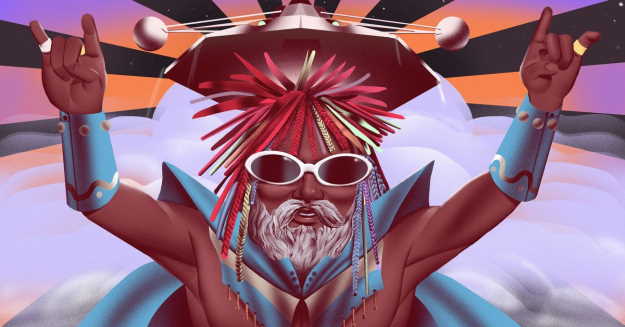
Illustration by Richard A. Chance |
"Crazy is a prerequisite to make it in this business," George Clinton growls, a wad of rolling papers curling between his fingertips. "A prerequisite. But you have to govern that crazy, you have to be in charge of the crazy. Don't do it just 'cause it works. You got to know when I ain't that crazy."
The high priest of funk is sermonizing from behind a desk in his eminently glossy suite at the Park Hyatt in midtown Manhattan. The floor-to-ceiling windows import golden rays. Clinton bobs faintly, left to right, fiddling his hands with purpose, chin pointing to the floor. His head is shaved, his goatee is dyed black, and his voice is gruff.
Clinton, who is 81 years old, often punctuates a lesson with laughter. He's prone to name-dropping: "Eminem, I've known him since 14, 15 years old," or "Mos Def, I knew his parents," or "Tupac and Digital Underground, we was already like that," or "Prince, he was a baby Funk-eteer." Sitting in a bright blue T-shirt bearing a comic-book seal with the names of his two transcendent bands-Parliament and Funkadelic-emblazoned at the midsection, Clinton presents as an apparition of sorts. The picture's quite literally not believable.
The guy known for shaving outlines of dicks in his hair, performing sometimes in the nude, embedding Afrofuturism into the mainstream, and reshaping American music holds court from an angular office chair while his wife, Carlon, supplies him with his daily allotment of imported spring water. It's not unreasonable to say he's one of the five or 10 most impactful acts breathing, in or outside of the country. One does not imagine he sends his own emails, let alone rolls his own joints. Clinton knows the length of the shadow he casts-he even enjoys kicking at it sometimes-but he generally tends to sidestep the problem of his mythos. This is less a result of PR savvy (which he has in bundles) than it is adherence to an I-can't-keep-whooping-on-everyone-if-I-look-back-at-each-swing kind of creed.
"That Godfather of Funk or whatever," Clinton says, eyes wandering to a tray of room-service veggies nearby. "I tell myself that shit in the bathroom. So when I finish patting myself on the back, I flush the toilet and leave that shit in there."
Pre-pandemic, Clinton appeared to be at the precipice of retirement. In April 2018, he penned a statement formally announcing his plans to step back from touring. A few weeks later, accompanied by the most recent variation of Funkadelic, Clinton played a handful of former haunts-Howard Theatre in D.C., the Crystal Ballroom in Portland-for what was billed as the final time. While still equipped with the flair that defined the performances of his youth, he was clearly limited in mobility. He had to take breaks between songs. A stool was present on-stage alongside his mic stand. In his prime Clinton moved like a rockstar, in and away from the limelight. He played in different cities every evening, maintaining a regular diet of cartilage-crunching leaps and daring wire-descents from arena rafters. Self-admittedly, in the later decades of his career Clinton was addicted to crack. (He quit the drug in the early 2000s.) Given the toll his body had long endured and his advancing age, stepping away seemed rational, prudent even.
"I really was trying to be 80 years old," Clinton swears. "Then I realized, 'No, what you gonna do when you do quit?'"
So he didn't-at least not yet. As we speak in June, he's in New York to kick off what may or may not be the real, final run: the One Nation Under a Groove Tour, which would go through late September. Then he's done. For good. He's not walking through that door. Until, of course, he is. Which, you know, he might. "Oh, I'll probably come back in a year," Clinton cackles. "Still got the vibe."
This capacity for mental contortion is what's at least in part responsible for taking him from odd jobs and a barbershop gig in postwar Plainfield, New Jersey, to Berry Gordy's Detroit and a one-way ticket through musical deep space. Clinton's go-to origin story involves reaching sonic enlightenment the first time he heard Hendrix take "noise to church," but that skips about three steps and is half as interesting as the truth. His mother listened to swing records from Louis Jordan and adored Sam Cooke during the crooner's early era with the Soul Stirrers. In Clinton's teens and early 20s he worshipped at the altar of doo-wop, incubating as a songwriter for Motown Records. He picked up a knack for cliches, puns, and hooks, and scored a top-10 hit with the first incarnation of the group-known then as "The Parliaments"-featuring Clinton, Raymond Davis, Calvin Simon, Clarence Haskins, and Grady Thomas.
"That Godfather of Funk or whatever. I tell myself that shit in the bathroom. So when I finish patting myself on the back, I flush the toilet and leave that shit in there."
-George Clinton
Clinton says his biggest fear at the time was the prospect of becoming "an old washed-up doo-wop group." He confronted this phobia by veering to other planets, political frameworks, planes of reality. Partly in response to record-deal chicanery, and partly because it simply sounded groovier, "The Parliaments" became "Funkadelic." (They would reclaim "Parliament" a few years later, performing and recording separately under both names.) Clinton and Co. toured with Vanilla Fudge and the Boxtops; got heavy into Cream, Richie Havens, and, indeed, Hendrix; and were thoroughly changed by the cultural big bang of the late 1960s. He nurtured two distinct styles for the bands: Parliament was "a more vocal, stage-oriented funk-opera" while Funkadelic was "a musical balance of freedom and control." Album to album, Clinton developed a stable of characters, themes, and settings for the groups-intergalactic freedom fighters, rhythm-less villains, and Black utopias. The cover art was always hella freaky. The end product, music-wise, melded early funk, psychedelia, rhythm and blues, rock, jazz, gospel, and soul, all while blurring the constructs of comedy, horniness, profundity, spirituality, structure, and strangeness.
"He picks up on everything, you know?" says trumpeter Fred Wesley, a vital member of both Parliament and James Brown's touring band. "Whatever's happening in the street, he grasps onto it and can make a record out of it. Sometimes it'll be mysterious, sometimes it'll be obvious. ... [He's] someone who listens to the audience and gives back to the audience the way the audience gives to him."
The collaborative nature of this arc is often underplayed in the public mind in favor of crude hero worship-something Clinton is tangibly averse to. He's not so much humble up close as he is in thrall to the art form. His is an almost spiritual pursuit: nirvana in the quest for tones. His method? "I'm a director," Clinton says. "I can get it out of people-even what they don't know they got."
It's no coincidence, in his eyes, that his groups' cherished export, P-Funk, became hip-hop's foundational sound (alongside James Brown's percussive gusto). It's no accident that it continues to find new hosts, in artists ranging from the Sugar Hill Gang to Public Enemy, Dr. Dre, Too Short, Outkast, Kendrick Lamar, and, most recently, Donald Glover. For Clinton, funk is the connective tissue: of music, of Black American artistry, of life itself. It's a state of mind. But also everywhere. And maybe, something to aspire to. "You've seen people on the drum, just make a groove in Africa, just a beat. When you see those little kids dancing to those African beats, you can see that's the root of all this shit," Clinton says in a timbre thick as smoke. "Then you can see slick-ass motherfuckers, like jazz musicians. They can get funky as all hell. They know the back-and-forth, so when they hang loose and just funk around and just jam, they being funky."
He's craning his neck and lilting his eyebrows and scanning the suite. Clinton buzzes in the silence of what he deems to be a well-imparted point. Then he flashes both canines and says: "Funk is anything you need it to be."
Carlon, a small, kind, mocha-brown woman, who'd been sprawled on a nearby loveseat, ventures to and from the room in cycles. Showtime, at Central Park's Summerstage, is in less than three hours. Clinton has no set list. Sometimes he might identify an opening track beforehand, but that depends on what he can glean backstage from the audience. He is as deeply in love with the art of performance-its sweet symmetry of comfort and chaos-as he has ever been. "On stage we can work it. We rule shit on stage. And if I ain't able to do that, it might be a problem. You know?" Clinton says, peering out at the vacant sofa. "So that's why even doing all the drugs, no, that ain't got a chance of stopping me. I mean, I knew I wasn't supposed to be doing that all that time, and for that long. I'm an old ass man still doing that. But I knew, OK, as long as I'm doing music, I'll outlast this. Whatever the bullshit is."
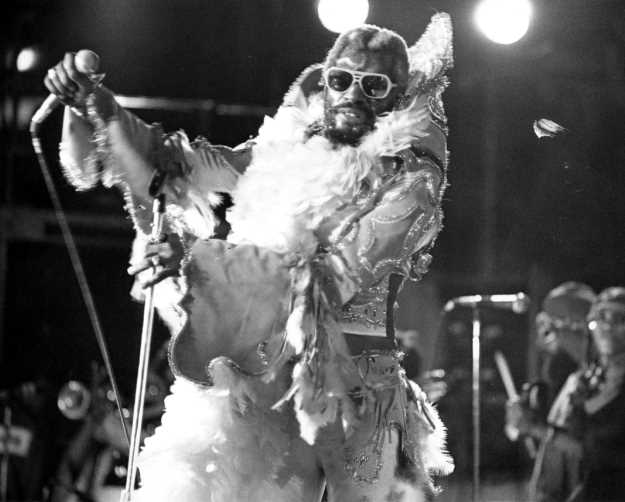
Clinton in 1976. Photo by Michael Ochs Archives/Getty Images |
She's got the papers and his phone, plus his joints. Carlon says he'll have to take the show on the road. He laces up his shoes-high-tops, all vegan leather, pink bottoms, gold fern accents along the side-while the front door creaks open. A friend named Vivian drifts in.
"G," she greets Clinton, "I didn't get my hug today."
Her arms are open and her blond braids cascade past her shoulders.
"Hey, baby," Clinton purrs, mid-embrace.
"He brought this all the way from Tallahassee," Carlon says, passing a wide acrylic portrait to Vivian. "He said, 'I want her to have this one.'"
In Clinton's free time, he paints habitually. There was a period, somewhere in the dog days of lockdown, when he bought their entire hometown out of canvases. When there were no more to buy, he decorated birdhouses instead. The painting is littered with clefs-treble, bass, tenor-and daubs of orange and white. For years Clinton entrusted the Afrofuturist artist Pedro Bell with illustrating the album covers for Funkadelic records. (Bell also wrote the liner notes that helped establish the band's legend.) The creations often blended the hypersexual and the science fictional. Clinton's own visual work is less mind-bending but clearly cut from the same cloth. It's a bit Basquiat-ish in nature, if Basquiat ran a music symposium.
"Is it this way?" Vivian asks, tilting the sketch and canting her head. Clinton, facing the entryway, fits a blue see-through veil over his shoulders, and puts a sailor cap with the pearly outline of an eye atop his dome. He walks toward the door. Spotting his reflection in a full-length mirror, he lingers and says, in a deeply guttural tone, "That's psychedelic." Then he exits the suite and heads to the elevator.
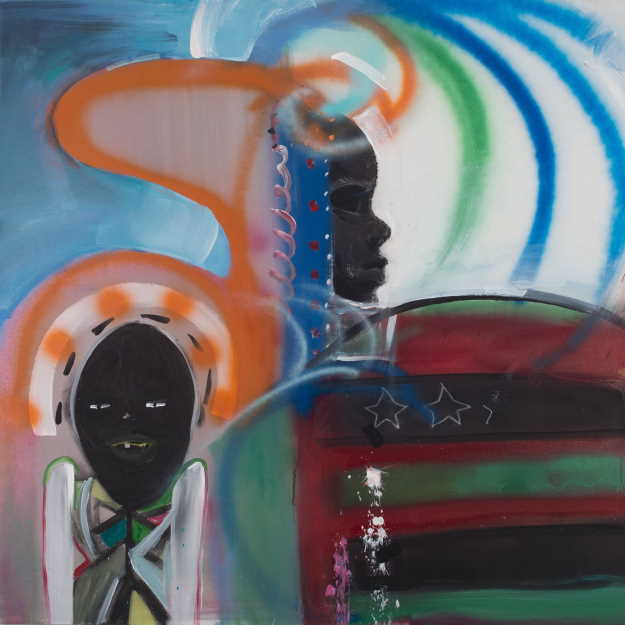
George Clinton's "Black's Live Masterfully" (2020). Credit: Courtesy of the artist and Spring McManus Advisory |
This time last year, Clinton hosted a private party for his friends and family in celebration of his 80th birthday. His 81st is in late July and he's openly bracing for it to arrive.
"No, baby," Carlon says, "tell them you want to be known as the guy that talked about copyright."
Clinton nods his head, dutifully. He straightens his body. "If it's going to be something that's remembered," he says, "let that be it."
The car glides among Central Park's dips and curves. The interior is hazy with smoke. Clinton leans fully back in his seat, eyes wide open, vision fixed to the roof. He exhales deeply.
"That'll clean up for a lot of shit," he says, joking but also not.
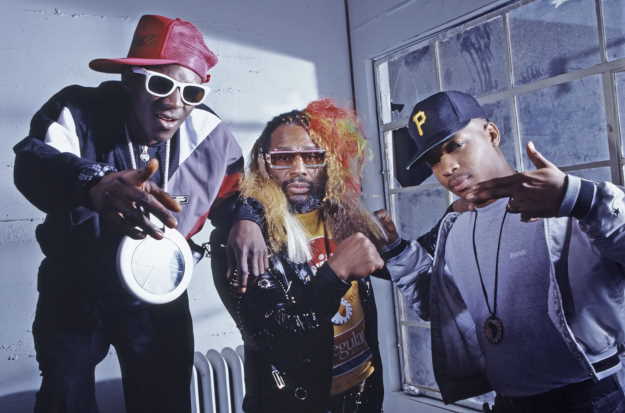
Clinton with Flavor Flav and Chuck D in 1989. Photo by Aaron Rapoport/Corbis/Getty Images |
On a hummock near Strawberry Fields, cordoned off from the general public, Uncle Jam slides open the passenger-side door of the van and lets the scents of summer mingle. He's saddled up next to a grill. It's where his ride is parked. Hot 97 vet Funkmaster Flex, the DJ for the evening's affairs, wedges himself between the vehicle and a concrete barrier adjoining the griddle. He extends his hand to Clinton.
"How are you, my brother?" Flex asks, all teeth and decibels. "Everything good?"
"Oh man, you got it," Clinton says. "Still hanging, bro."
"We got no choice man," Flex says. "Ain't ready to give it up."
"Ain't going to give it up," Clinton adds.
Having bantered in the haze of humidity, the two part ways, and Clinton tries to close his eyes for a moment. He's thwarted often. At least four Funkadelic members arrive and greet Clinton, mid-slumber, from his mobile throne. The last is one of his proteges, the singer Kendra Foster, of D'Angelo & the Vanguard fame.
"Look at you. Sitting there looking cool as a cucumber," Foster says to Clinton. She passes him a plate of barbeque. "How are you? Hey now, Papa."
Clinton shifts upward in his seat.
"Papa," Foster says, "You look good."
"Come on now," Clinton says. "You just saying that. Some lady said it the other day, she's like, 'No, no you don't understand, you look good.'"
It's not exactly untrue. By physical appearance alone you would not guess he is a day over 70. His face is notably devoid of wrinkles, as are his hands. He's trimmed his figure considerably from even a few years ago. Clinton stays active by swimming on his property in Tallahassee and fishing off the coast. He doesn't have a boat, but he makes his way when he needs to. "I usually rent one," says Clinton. "Then they take us out 10 miles off the shore and we catch mahi-mahi, wahoo. Then we do marlin."
"He picks up on everything, you know? Whatever's happening in the street, he grasps onto it and can make a record out of it."
-Trumpeter Fred Wesley
The sound of the opening act echoes back through the bowels of the stage. Carlon hands Clinton a couple of hats; he shuffles through them, carefully identifying the proper accoutrement for tonight's performance. In a flash, Clinton rises from his seat, slides his door open, and walks with his wife to his dressing room. The maestro has clocked in; George is now gone. Cloaked in the sudden silence of Clinton's wake, Vivian stands in front of the van, facing his path. "He once said to me," she remembers, "that retiring was harder than quitting crack." Then she shakes her head and smirks.
Backstage, a reunion is in full swing-sons, daughters, grandchildren, great-grandchildren, half-siblings, friends, acquaintances, hangers-on. Michael Hampton-who was practically raised in Funkadelic and has played guitar for the band since '74-wears a navy bandanna and a whole lot of denim, and says he will support Clinton for as long as he'd like to play. After all, that's what the blues legends did before them. "They played," Hampton says, "until they had to sit down and play." To Hampton's right, the group's longtime bassist Lige Curry takes his hands out of an army green jacket, and says that he was fully convinced to tag along the moment Clinton uttered the words, "This will be good for me."
Dr. Funkenstein, by the way, is in a shipping container. Other contents include: a bottle of yellow gatorade, a red backpack with a drawstring around the opening, more weed, used red plastic cups, some half-empty Heineken bottles, and a slick Persian rug. The crate is a tricked-out dressing room. Bright green on the outside; two floors high. Its windows are various jutting geometric shapes. Inside, Clinton is as close as he'll ever get to planning out the show.
He's leaning toward opening with "Cosmic Slop," a five-and-a-half-minute negro spirtual about sex work. Clinton is stretched out on a sofa that's speckled gray and barely fits two people. He's thinking about James Brown. (He tends not to look back but when he does there's gold along the trail.) "He didn't have to say shit," Clinton says. "He just said what he said and it makes sense from there. If it don't make sense, it works out. It's that rhythm of Blackness, grunts and groans. There's a language in there. Church, it's the same thing."
He shoos away a few would-be visitors with nothing but a lean and a glance. Don't get him started on Miles. "Bad motherfucker," Clinton says. "Probably one of the couple of mothers that can claim cool."
One of the couple. You know them when you see them. And Clinton's moved among the gods. Aretha. Marvin. Marley. He speaks their language. It's this knowledge that undergirds all of his movements, the ones on stage, the ones in the dark, and the ones that show up only on tape: The guy's way out there. Light-years past where the search becomes anything other than indefinite.
So when he calls Miles Davis "one of the couple of mothers that can claim cool," or says that James Brown "didn't have to say shit," Clinton's telling the truth, about Miles, and James, and-most of all-himself. Because there's only but a "couple" of those "mothers" that have ever been made, and he conversed with them on the holy plain. Touched the face of god.
And after that nothing less will ever do.
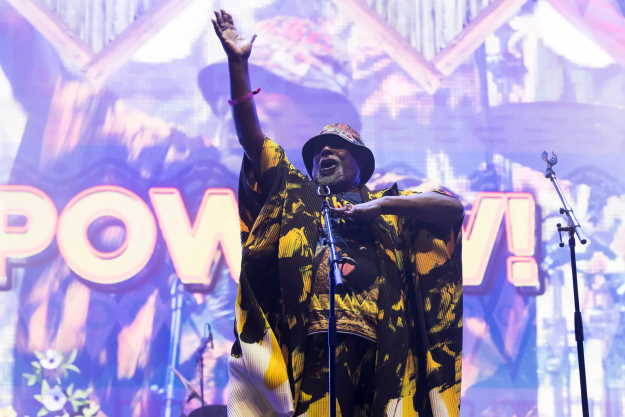
Clinton performs at the Okeechobee Music & Arts Festival this year in Okeechobee, Florida. Photo by Jason Koerner/Getty Images |
Greetings to the granddaughter with the pastel T-shirt; love to the grandson with the rainbow dreads; a smile for the white man in a pair of scuffed Adidas; half a hug for the wavy-haired sister in all white; slight dap for the brother with the "just a kid from Newark" tee; a pose with a mean mug for all who can see. Clinton moves to a seat and he smokes and he waves. Less than a minute to showtime. The crowd is pulsing and the band is primed. Enough with the pleasantries, let's take it to the stage.
Buzzing like a loopy wasp, arms swinging, knees flailing, Clinton bursts into the crowd's view. He's met by a booming inhale followed by an even larger exhale, the collective voice of a little screaming nation (under a groove) in the middle of Central Park. Clinton opts for a funked-up version of "Jump Around" as an opener. Call it recycling; finding the through lines. House of Pain samples Funkadelic, so Clinton funks House of Pain. Waving the mic to and from the crowd, he directs a call-and-response that goes "Shit goddamn get off your ass and jam," until the track recedes and the show starts in full. Clinton extends his arms and the opening notes of "Cosmic Slop" finally rain out.
He steps back from the mic and simply bobs his head. The chorus bellows-"I can hear my mother call / I can hear my mother call"-and the guitars weep ungently. Clinton directs each section of the band with hand signals and head nods. He shifts exclusively between an expression of steady focus and a wry smirk.
The song teeters: heavy to lively. He blows out a kiss. Three horns kick in at once and by the time the audience has processed the sheer euphoria of this sound-the way it summons the heartbeat of the track and the body-Clinton is pointing straight to the brass section like he just dropped another precious point to ponder. His limbs are held wide enough to hug the crowd itself. Clinton prances through the twilight frenzied by the very joy reflected to him. There is chaos and there is comfort. Then, without a word, the high priest returns to his sermon. He appears reborn.
"Somebody once asked him, 'A lot of people have said they would die on the stage. Would you consider that?'" Carlon confessed before her husband lit the stage ablaze. "George was like, 'At least I'd go out funking.'"
Only one side of her mouth curled to a smile.
"So, no," she said, baring the hunger that orbits and propels Clinton- his final act of absurd and tender devotion to the faith.
"I don't think he'll ever retire."
|
|